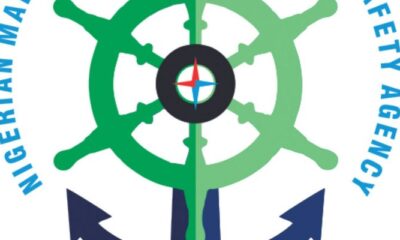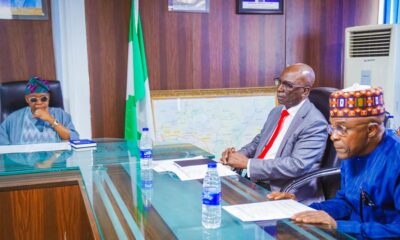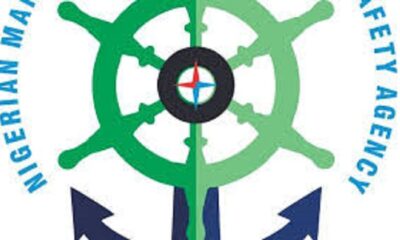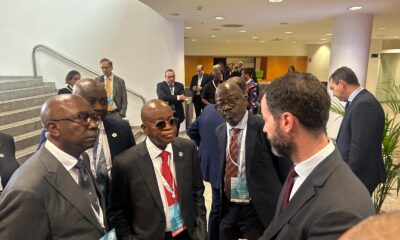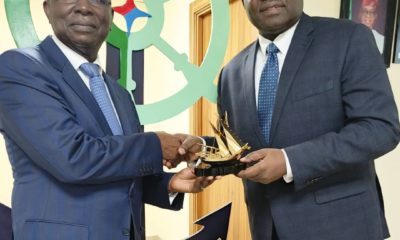Maritime
NIMASA DG, Mobereola Assures Maritime Stakeholders Of Inclusivity
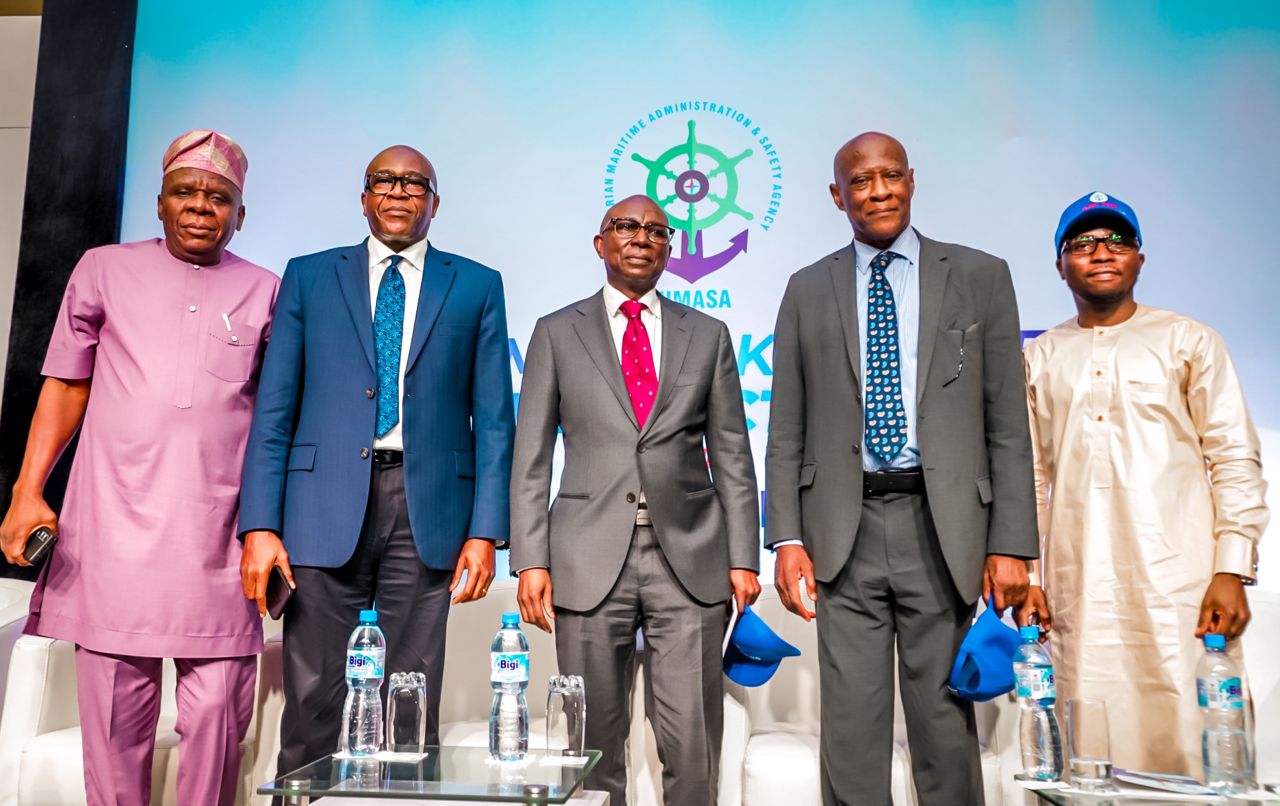
The Director General of the Nigerian Maritime Administration and Safety Agency (NIMASA), Dr. Dayo Mobereola has assured stakeholders in the Nigerian maritime sector of inclusivity, towards the development of the sector.
He made this assertion during an interactive session with maritime stakeholders in Lagos, where he also pointed out that President Bola Ahmed Tinubu through the Federal Ministry of Marine and Blue Economy had ureged stakeholders to partner with the Government in developing the sector.
Dr Mobereola said, “It is important that we develop clear objectives, goals, and strategies to advance the industry and align with the vision of the President of the Federal Republic of Nigeria and the Minister of Marine and Blue Economy.
“While the Agency will continue to play its part in serving the industry, it is important that we all collaborate to achieve a sustainable maritime sector, as all efforts should be inclusive and collective.”
The Director General seized the opportunity to reassure shipowners on the Agency’s commitment to expediting the automation of the ship registry, a move, which would significantly boost shipping development in Nigeria by enhancing efficiency and streamlining processes.
Earlier in his, welcome address, Captain Iheanacho, a former Nigerian Minister of Interior and chairman of the occasion, expressed the industry’s delight at the appointment of Mobereola, whom he described as a seasoned and accomplished maritime professional.
He noted that Mobereola’s extensive experience and expertise will be invaluable in driving the administration and development of the Nigerian maritime industry forward.
He expressed optimism that under the current leadership of the Agency, Nigeria would make significant strides in promoting ship safety, shipping development, maritime security, and environmental sustainability in our waters.
He noted that Mobereola’s dedication to capacity building will undoubtedly position Nigeria as a key player in the global maritime industry.
He added that stakeholders are willing to collaborate with the DG to move the sector forward.
“We expect the DG to be fully aware of the impact of technological developments in the Marine and Blue Economy industry, to guide in the formulation of policies to be developed. We look forward to working together with you to address the challenges ahead and to seize the opportunities that lie before us”, Iheanacho said.
Captain Iheanacho acknowledged the hard work, resilience and determination of past Directors-General and other stakeholders who were present, noting that their commitments contributed to the robust framework from which the Agency and the maritime industry at large are benefiting.
In his presentation titled; Marine and Blue Economy: Navigating to the Promised Land, Dr. Akabogu, a maritime lawyer, proposed various reforms including policy and agenda verification, enhanced data and technology utilization, minimum industry standards, deliberate recruitment of professionals, empowerment protocols, development of standard shipping development courses, and accountability measures for NIMASA and the industry as a whole. He emphasized the need for routine meetings based on clear identifiable milestones to drive accountability and progress for the sector.
On her part, Princess Vicky Haastrup, the President of the Seaport Terminal Operators Association of Nigeria (STOAN), emphasized the critical importance of dockworkers in the industry. “Where there are no dockworkers, there are no ships”, she said. Therefore, the training of dockworkers is very critical.
Comrade Adewale Adeyanju, the President General of the Nigerian Maritime Workers Union (MWUN), who supported Haastrup’s position, emphasized the importance of continually training dockworkers and ensuring a decent work agenda, in line with the Maritime Labour Convention (MLC) 2006.
Alhaji Aminu Umar, who spoke on behalf of the Ship Owners Association of Nigeria, emphasized the need for further discussions and interactions regarding the International advancements in the maritime industry. He urged the Director-General to consider the independence of the Ship Registry as observed in other maritime countries.
The various women’s associations in the industry; WISTA, WIMOWCA, WILAT, who were represented by Mrs. Tosan Emore-Edodo advocated for increased participation of women in the industry and called for support in promoting advocacy efforts.
Past Directors General of NIMASA who attended the event; Dr. Ade Dosunmu, Architect Ferdinand Agu, Barrister Temisan Omatseye; as well as former Board Chairman of NIMASA, Tijjani Ramalan, all pledged their support for the current administration.
The Flag Officer Commanding (FOC) Western Naval Command, Rear Admiral Mustapha Hassan, was also present at the event, which had representation from the Nigerian Maritime Law Association (NMLA), Association of Master Mariners, Ship Building and Ship Repair Association, among others.
Maritime
Maritime Governance: Minister Deposits Three Accession Instruments At IMO
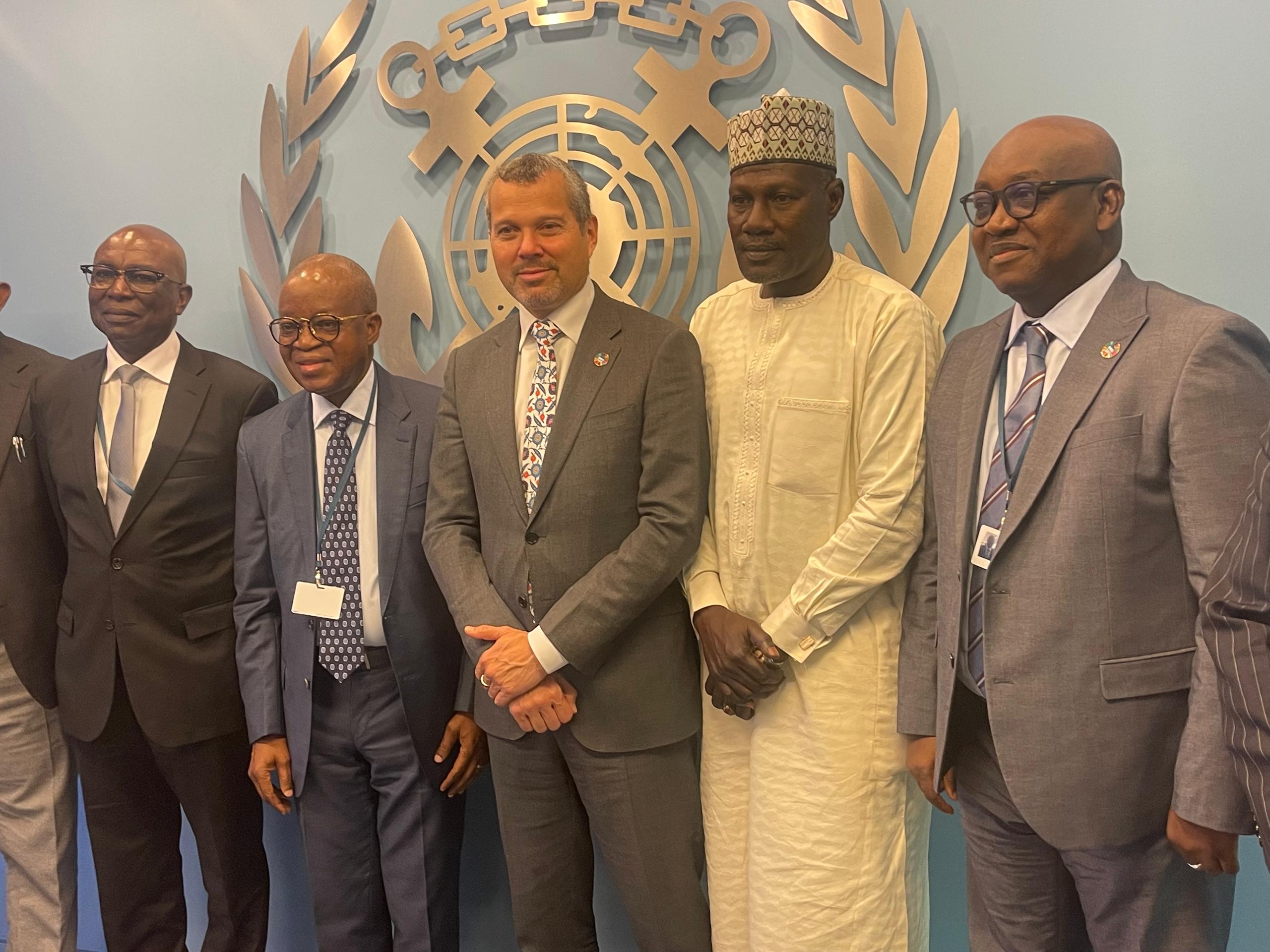
The Honourable Minister of Marine and Blue Economy, Adegboyega Oyetola has deposited three Instruments of Accession to IMO Conventions signed by President Bola Ahmed Tinubu with the global body.
He did so on Tuesday, at the headquarters of the International Maritime Organization (IMO), which acts as the repository for these conventions.
This move, coming a few weeks after Nigeria declared its intention to contest election for a seat on the IMO Council, is expected to enhance Nigeria’s maritime governance and align its practices with international standards, promoting maritime safety, security, and environmental protection.
Shortly after the presentation ceremonies, Oyetola informed the IMO Secretary General, Arsenio Dominguez, of the President’s commitment to ensuring that Nigeria aligns with international maritime standards regarding maritime safety, security, and sustainable marine practices.
ALSO READ: NNPCL Launches Utapate Crude Oil Blend, Eyes Production Expansion In 2025
He also called on the IMO to extend technical support to Nigeria.
In his words, “These instruments, duly acceded by His Excellency, the President of the Federal Republic of Nigeria, signify Nigeria’s continued commitment to aligning with international maritime standards, ensuring maritime safety and security, and promoting sustainable marine practices.
“We hereby request tailored technical cooperation under the Integrated Technical Cooperation Programme (ITCP) to enhance Nigeria’s compliance with IMO conventions and improve our maritime governance and implementation of the instruments we submitted today.”
On his part, Dominguez, acknowledged with appreciation the formal deposition of the Instruments of Accession, stating that it underscores Nigeria’s steadfast commitment to aligning with global maritime standards.
“I congratulate Nigeria for its exceptional efforts in acceding to these six critical IMO instruments. I encourage continued momentum by securing presidential assent to additional key conventions. We at the IMO remains fully committed to supporting Nigeria through technical cooperation and capacity-building initiatives to ensure the successful implementation of these instruments,” he stated.
The instruments Oyetola handed over to Dominguez include the instrument of accession to the 2005 Protocol to the Convention for the Suppression of Unlawful Acts against the Safety of Fixed Platforms Located on the Continental Shelf (SUA Protocol 2005), the instrument of accession to the International Convention on Standards of Training, Certification, and Watchkeeping for Fishing Vessel Personnel (STCW-F), and the instrument of accession to the Protocol Relating to Intervention on the High Seas in Cases of Pollution by Substances Other Than Oil (Intervention Protocol 1973).
It was gathered that three other Instruments of Accession signed by President Tinubu are undergoing further steps to complete the processes for their deposit.
Maritime
Capacity Dev’t: NIMASA Assures On Cabotage Vessel Financing Fund
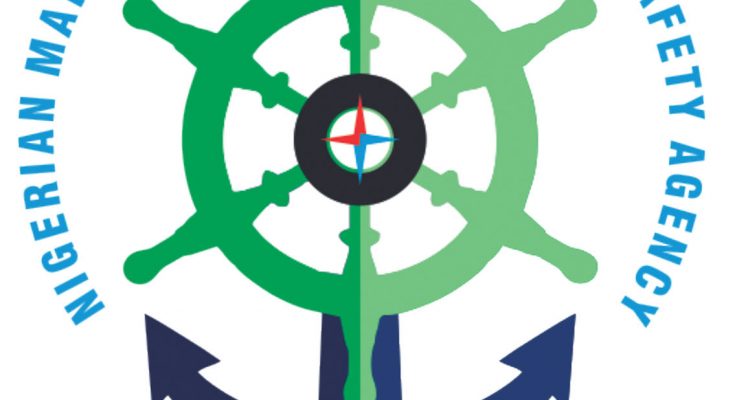
Funds accrued under the Cabotage Vessel Financing Fund (CVFF) are intact and currently held with the Central Bank of Nigeria (CBN) under the Single Treasury Account (TSA).
This assertion was made by the Nigerian Maritime Administration and Safety Agency (NIMASA), in a statement in Lagos on Tuesday.
The clarification became necessary to address “a misleading publication alleging that funds have disappeared from the CVFF account”.
ALSO READ: Okpebholo Hits Ground Running, Flags Off Edo’s 1st Flyover Bridge
The statement reads, in part, “The report of a missing money is both misleading and false.
“For the record, the Cabotage Vessel Financing Fund, securely held in the NIMASA account at the Central Bank of Nigeria (CBN), remains intact. There has been no disappearance of funds, and no illegal transactions, as the article suggests. This misinformation is a figment of the authors imagination, aimed at undermining NIMASA’s integrity, and mislead the public about the Agency’s operations.
“The Management of NIMASA will ensure that the CVFF is utilised in line with its statutory purpose. NIMASA Director General, Dr Mobereola has assured stakeholders of the safety of funds under the CVFF.”
The statement cited the DG thus, “Let us be clear that the CVFF account at the Central Bank of Nigeria is safe, intact, and secure. We at NIMASA will continue to manage it with the utmost responsibility, and there are no irregularities or illegal activities surrounding the funds. I urge the public to disregard this false narrative and to continue trusting the Agency’s ability to uphold the integrity of Nigeria’s maritime sector”.
It was gathered that the CVFF is a fund established under section 42 of the Coastal and Inland Shipping (Cabotage) Act 2003 to promote the development of indigenous ship acquisition capacity and to provide credit facilities to local maritime operators.
The NIMASA, assured of its commitment “to transparency, accountability, and the advancement of Nigeria’s maritime sector.”
Maritime
Okpebholo Hits Ground Running, Flags Off Edo’s 1st Flyover Bridge
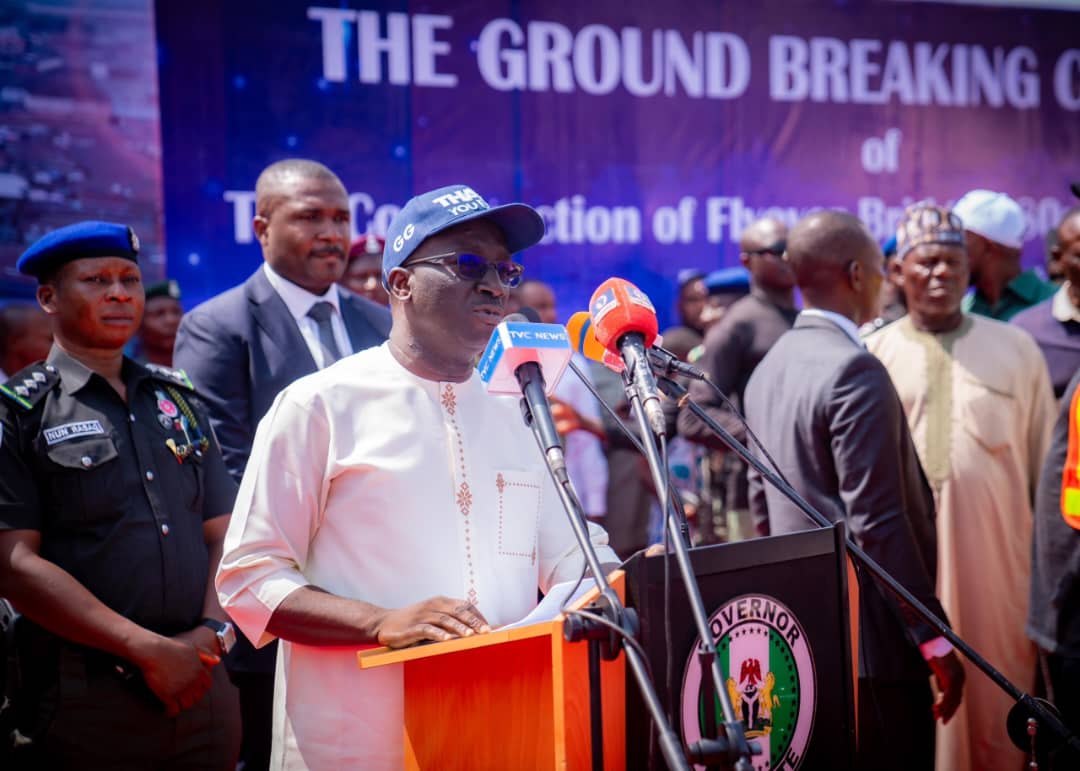
Edo State Governor, Senator Monday Okpebholo appears eager to deliver the dividends of democracy to his constituents.
This is discernible from the frenzy of activities being witnessed in his first few days on the job, including dissolution of boards, constitution of investigative panels, flagging off of infrastructure projects, among others.
In the bid to address the perennial road traffic congestion negatively impacting economic and social activities in Benin City, the state capital, Gov Okpebholo on Wednesday flagged off the construction of a flyover bridge.
Biztellers reports that the flyover bridge around the popular Ramat Park in the city centre is the first of such in the history of Edo State.
ALSO READ: Tinubu Seeks ₦1.767tn Loan to Tackle 2024 Budget Deficit
The Edo State Government made the disclosure in its verified handle on micro-blogging site, X, on Wednesday.
It wrote, “Traffic decongestion: Gov Okpebholo flags off first flyover in Edo.
“Edo State Governor, Sen. Monday Okpebholo has flagged off the construction of a flyover bridge at Ramat Park, Benin City, the State Capital, as part of immediate efforts to reduce traffic congestion in the city.”

